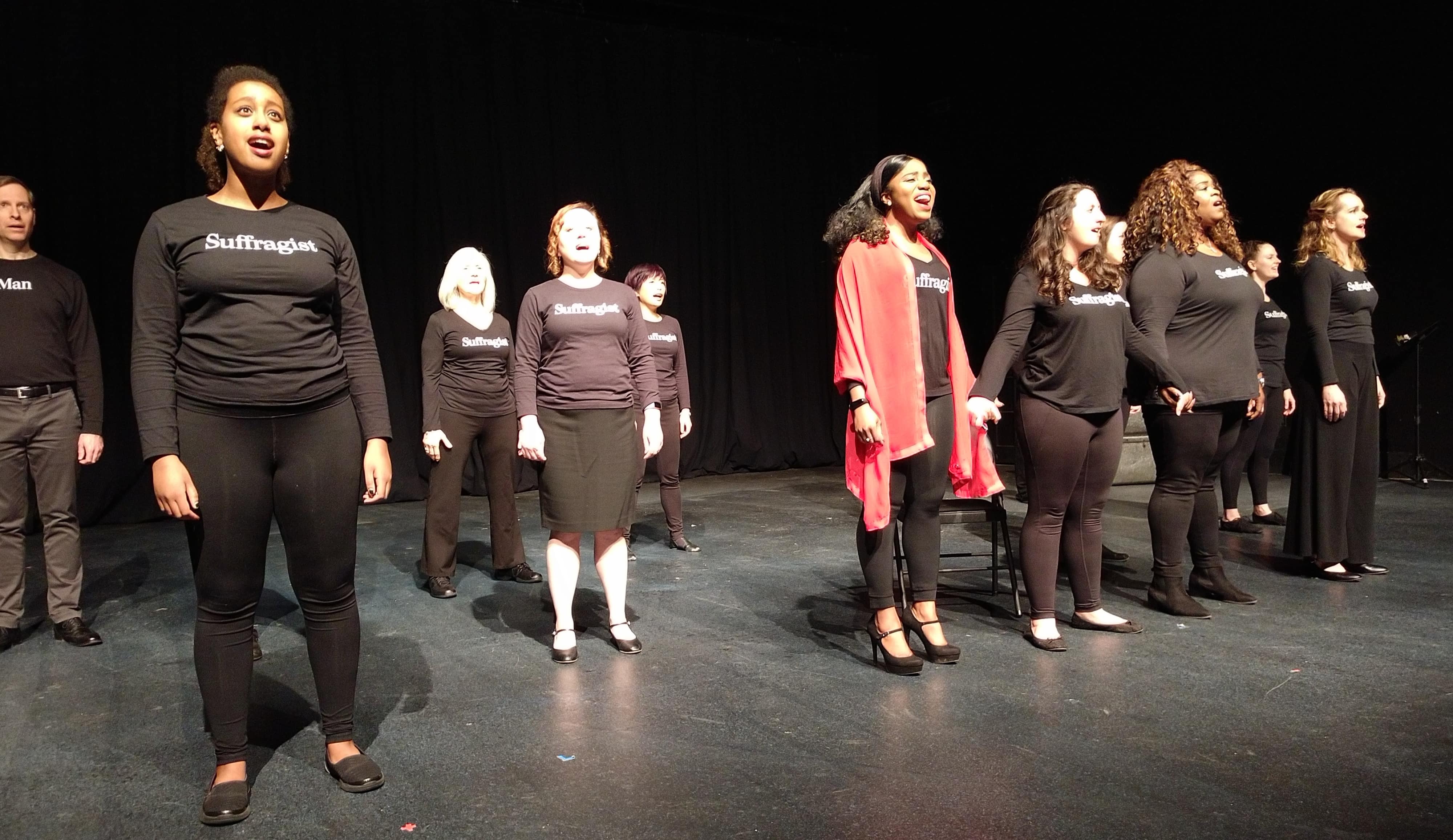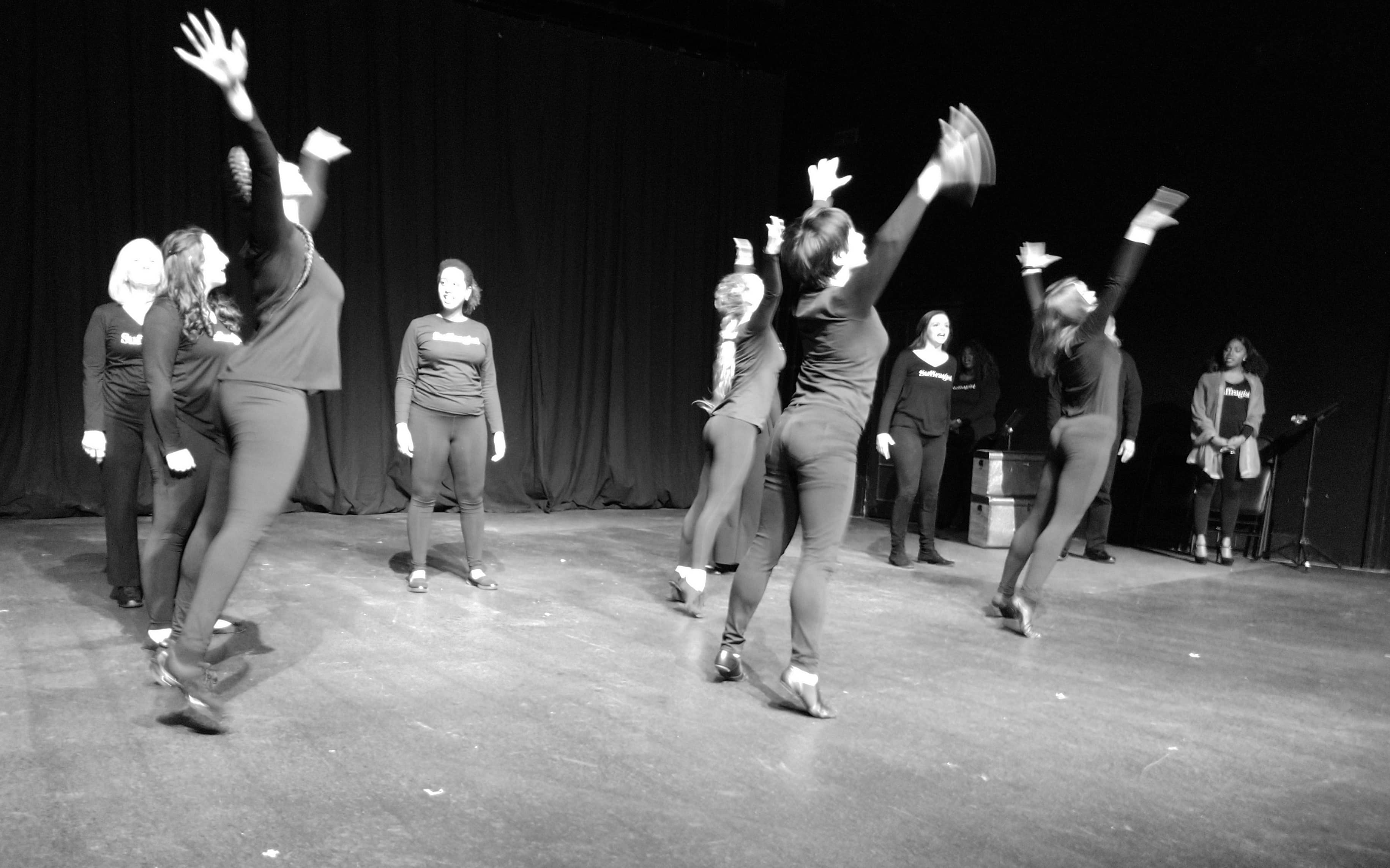It was “a century of struggle” before women in the United States won the right to vote in 1920, and the centenary of the amendment that cinched it, the nineteenth, is just around the corner. An original work titled 19: The Musical, based on the rarely told backstory of the fight for women’s suffrage, is being readied to mark that milestone, with book and lyrics by Jennifer Schwed and Doug Bradshaw and music by Charlie Barnett.
The three creators, who are also co-producers, have taken the unusual step of staging workshop performances of their work-in-development en route to its projected premiere in 2020. So it was that sixteen songs from 19 sung by a cast of sixteen at 1st Stage last weekend offered a tantalizing sneak peek at a making-of-American-history musicalization, inspired in part by what Lin-Manuel Miranda did in Hamilton.

It is impossible to imagine what Alice Paul and her sister suffragists would make of this telling of their story in song and dance. They were not exactly happy hoofers. The actual history of what they achieved and against what obstacles is a whole lot grittier and more grueling than could possibly be told in two tuneful acts. Historian Eleanor Flexner, in her classic Century of Struggle: The Women’s Rights Movement in the United States, quotes suffragist Carrie Chapman Catt’s unentertaining tally of what it took:
To get the word “male” in effect out of the Constitution cost the women of the country fifty-two years of pauseless campaign. . . . During that time they were forced to conduct fifty-six campaigns of referenda to male voters; 480 campaigns to get Legislatures to submit suffrage amendments to voters; 47 campaigns to get State constitutional conventions to write woman suffrage into state constitutions; 277 campaigns to get State party conventions to include woman suffrage planks; 30 campaigns to get presidential party conventions to adopt woman suffrage planks in party platforms, and 19 campaigns with 19 successive Congresses.
Sadly the story of the fight for women’s suffrage has effectively been written out of history. It is hardly taught in schools. Girls grow up with no idea what happened. And no Ken Burns (The Civil War) or Dustin Lance Black (When We Rise) has stepped forward to document and dignify the struggle for women’s suffrage in series television. During the post-show discussion Friday, the mostly young cast members were asked whether before their involvement in 19 they had heard of any of the historical figures who appear in the script. Tellingly, nearly none had.
For the purposes of this workshop, the singer-actor-dancers performed only 16 of the show’s 40-some musical numbers. There was not yet dialogue (only brief connective narration in between). There were not yet costumes (everyone wore black, with “Suffragist” in white letters on the women’s T-shirts; “Man,” on the men’s). There was not yet a set (just the empty black box). And there was not yet an orchestra (though Barnett, the very accomplished composer, was sensational accompanying on piano). All these elements are projected for the future.
For now, 19: The Musical as workshopped consists of some lively and inventive lyrics and a legit lovely show-tune score that hold genuine promise. But this is not a review. Given how much the show has changed since workshops began more than a year ago and how much will likely change before opening, it would be premature to do more than report and reflect on some intriguing features that came through at this stage.
First of all, the songs are terrific—very listenable melodies and rhythms, very sharp and on-point texts. In fact the workshop felt a bit like a buoyant backers audition. And while the ensemble often embodies the suffrage movement as a whole (as in the spritely opener, “We Won/19,” an exaltation over the amendment’s passage), a few clearly delineated historical figures lend easily followable focus. For instance, the central character, Alice Paul, becomes relatable right away with her solo “Dear Mama,” and her throughline closely follows the two-act story arc. Her encounter with British suffragists Christabel Pankhurst and Emmeline Pankhurst dramatizes nicely her growing convictions about “The Reasons” for women’s suffrage. Movement foremother Susan B. Anthony (called Sue B), who died before suffrage was won, shows up oddly as a kind of advisory apparition (perhaps because her name recognition exceeds all others’). But importantly, the African-American journalist Ida B. Wells weighs in to confront the Southern white racism that infected the women’s suffrage movement and that 19, in “Put Yourself in My Shoes,” does not shy from.
It’s when the book and lyrics take on that troubling history of race and sex intersection that the musical comes most alive with contemporary resonance. I wished for more such teeth and substance. By contrast, some of the other musical numbers selected for this workshop bordered on storybookish, sentimental, and simplistic—perhaps because intervening set-up scenes, which typically provide dramatic tension and heft, were not there yet.

Two musical numbers, each centered on a male historical figure, happened to contain within them some of the most interesting character-driven storytelling. The delightfully spot-on “Sensible Girl,” which President Woodrow Wilson sings to suffragists who’ve come to his office, is wittily dripping with condescension. And in the touchingly amusing “Harry Listen to Your Mother,” we see legislator Harry Burn’s vote change from nay to yea on the strength of his mama’s moral suasion.
Yet curiously, other than in those two quite mild-mannered scenes, the actual fact of misogynist opposition to women’s suffrage is given very short shrift. I caught one wicked lyric line about how men who are “hostile” are “from Hades,” but for the most part, the storytelling treats men with ladylike gloves. This struck me as unnecessarily timid in an era when books like Rage Becomes Her and Good and Mad are out there. Arguably even this entertainment about women’s suffrage lite is an improvement on the unending darkness to which that protofeminist triumph has been consigned. By why pass up an opportunity to give voice through musical theater to the righteous anger that suffragists had to suppress back then?
Song List
ACT I
We Won/19
Easy
Dear Mama
The Reasons
Partners in Crime
New World Order
Will You Be Here For Me?
Put Yourself in My Shoes
The Bloody March
Sensible Girl
ACT II
Silence
Damned If I Do
Jailed for Freedom
Victory Will Be Mine
Harry Listen to Your Mother
Reclaiming My Time
Cast
Narrator: Elizabeth Keith
Alice Paul: Katie Ganem
Carrie Chapman Catt: Meredith Eib (January 11)/Maria Ciarrocchi (January 12)
Ida B. Wells: Millicent Scarlett
Lucy Burns: Meredith Eib
Sue B: Debora Crabbe
Christabel Pankhurst: Elizabeth Keith
Emmeline Pankhurst: Millicent Scarlett
President Woodrow Wilson: Brian Lyons-Burke
Harry Burn: Michael Keith
Chorus & Dancers: Karen Bralove, Kristen Briscoe, Bethel Elias, Cincin Fang, Haylee Green, Danielle Marquis
Production Team
Jennifer Schwed: Writer/Lyricist/Director/Producer
Doug Bradshaw: Writer/Lyricist/Director/Producer
Charlie Barnett: Composer/MusicalDirector/Arranger/ Piano/Producer
Vocal Captain: Millicent Scarlett
Choreography: Danielle Marquis, Angela Norris
Dance Captain: Kristen Briscoe
Running Time: 65 minutes, with no intermission.
19: The Musical played January 11 and 12, 2019, produced by Through the 4th Wall performing at 1st Stage – 1524 Spring Hill Road, in McLean, VA. 19: The Musical will be performed again Friday, January 18, 2019, at The Hill Center – 921 Pennsylvania Avenue, SE, in Washington, DC, as part of the One Woman One Vote Festival. Ticket information can be found online.
The One Woman One Vote Festival: Raising 100 years of women’s voices in society, the One Woman, One Vote 2020 Festival is a collaboration with national organizations and cultural institutions to present films, concerts, exhibitions, and public events leading into the commemoration of the centennial year of the 19th Amendment passing, and the OWOV Film Festival in March 2020. The film festival event showcases documentary and dramatic films that embrace both history and contemporary issues that make a difference for all women today. The festival is being organized by Bonnie Nelson Schwartz.
In honor of the upcoming Women’s March, DC Theater Arts is partnering with A Tour of Her Own, a women-run walking-tour company offering women’s history tours throughout DC. Don’t miss their February 2nd tour “Women on Stage: Raising the Curtain on the Washington Theater Scene.”





Kudos to reviewer John Stoltenberg– Few men have the gumption to say that a piece of theater needs more focus on the ills of misogyny! As part of the creative team who is writing/directing/producing 19: The Musical, we want John (and his readers) to rest assured, that in the full show, men are most definitely not treated with kid gloves. We weren’t going to have the time to fully resolve things in the shortened format of a one-hour workshop, so we selected a mix of songs (heavy and lighter/fun ones) to give a broad sample of what to expect in 19. Hang on to your hats fellas, in the full show, it’s gonna get rough.